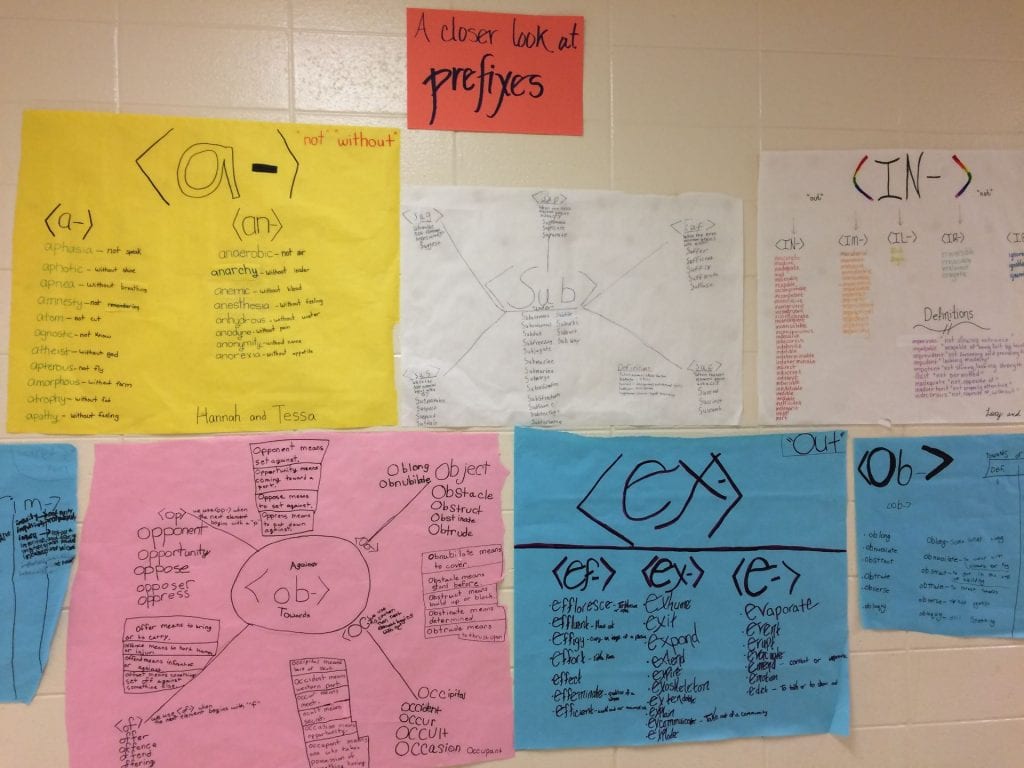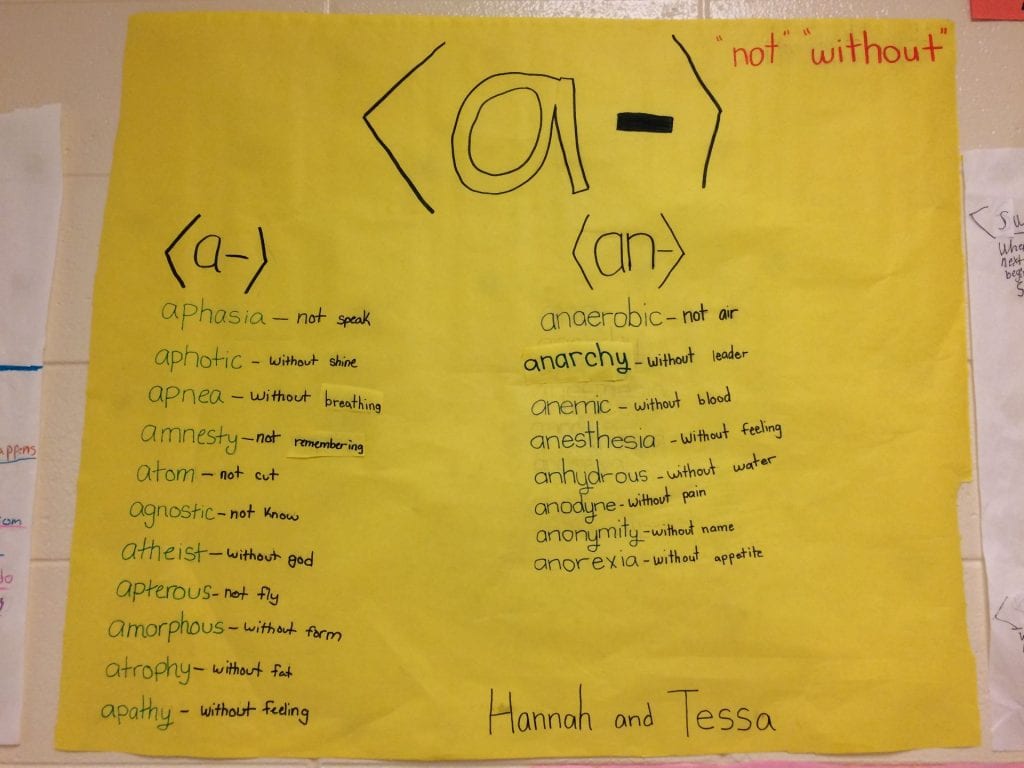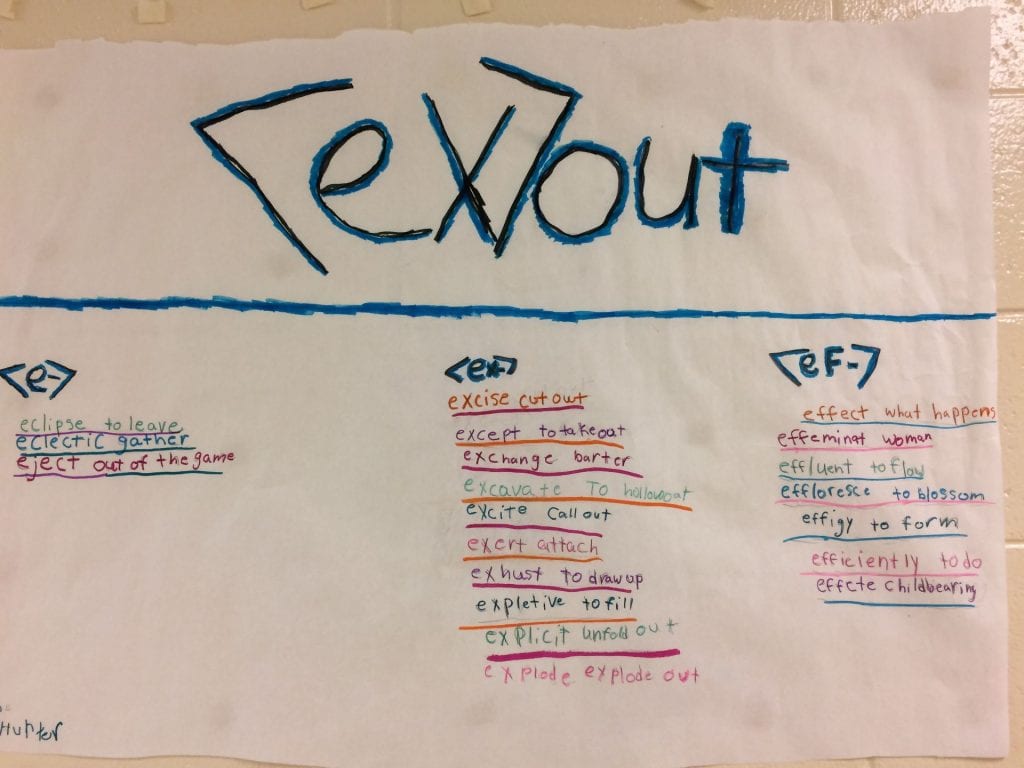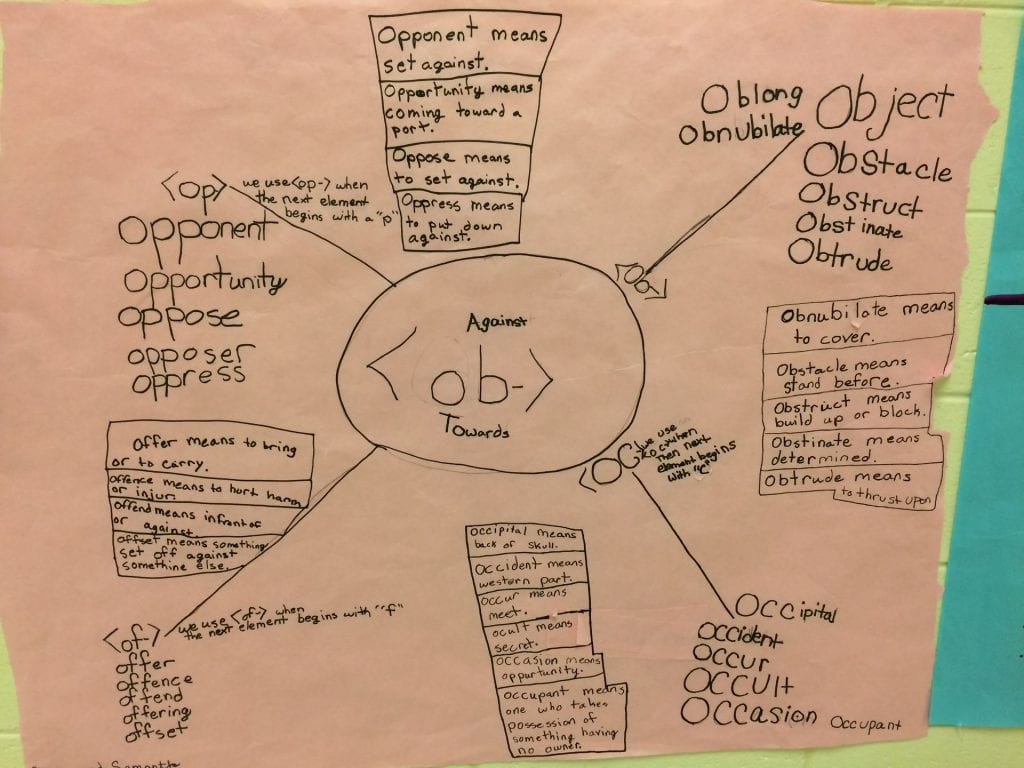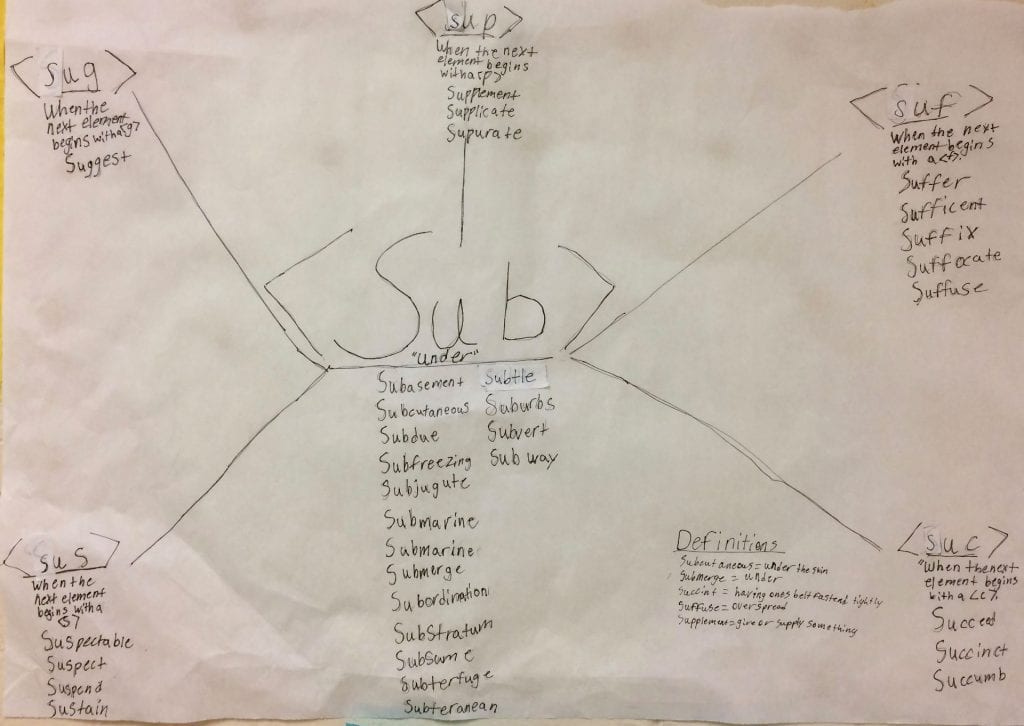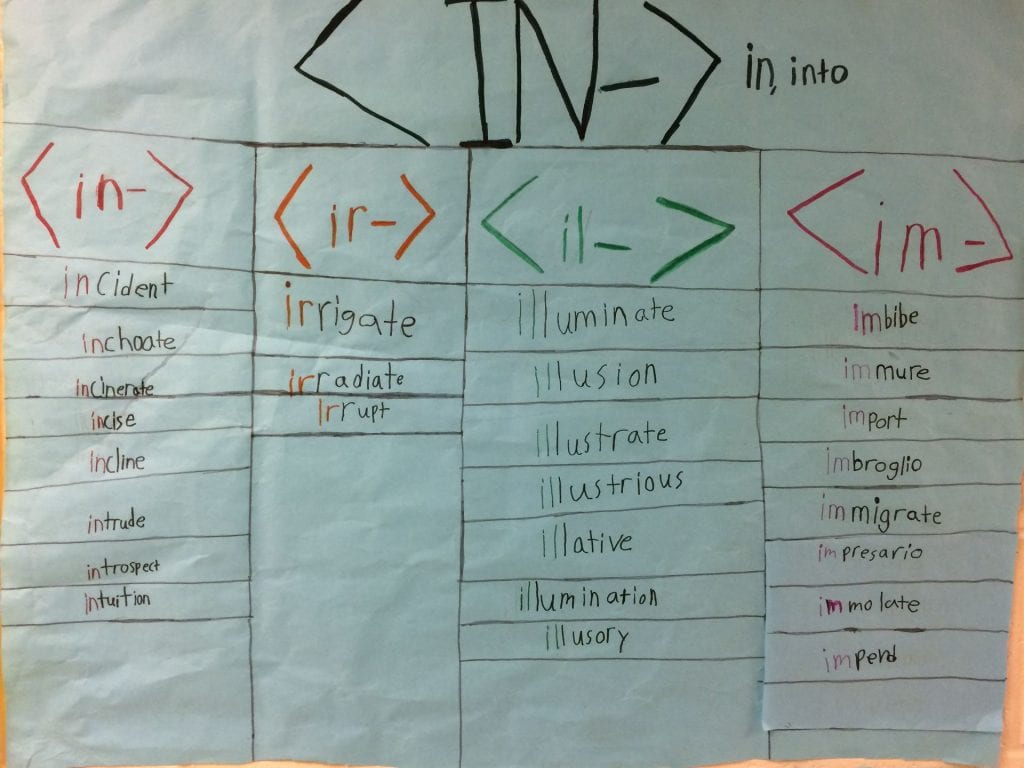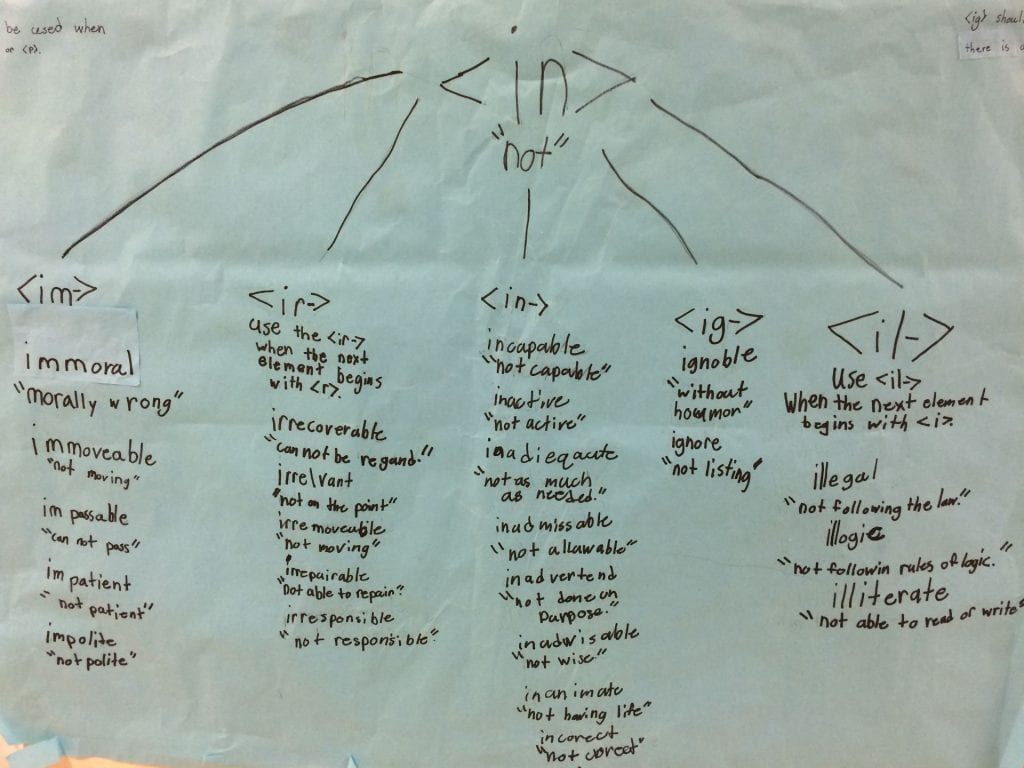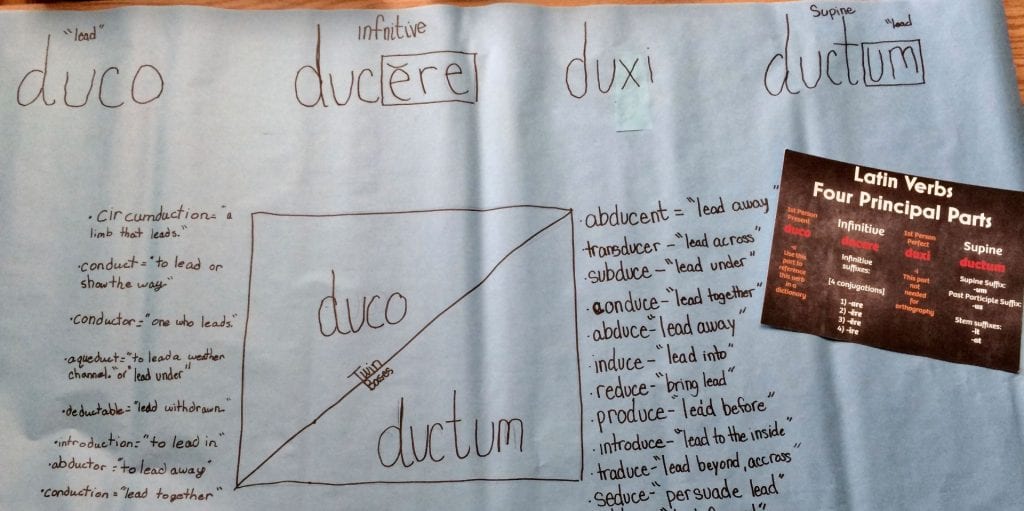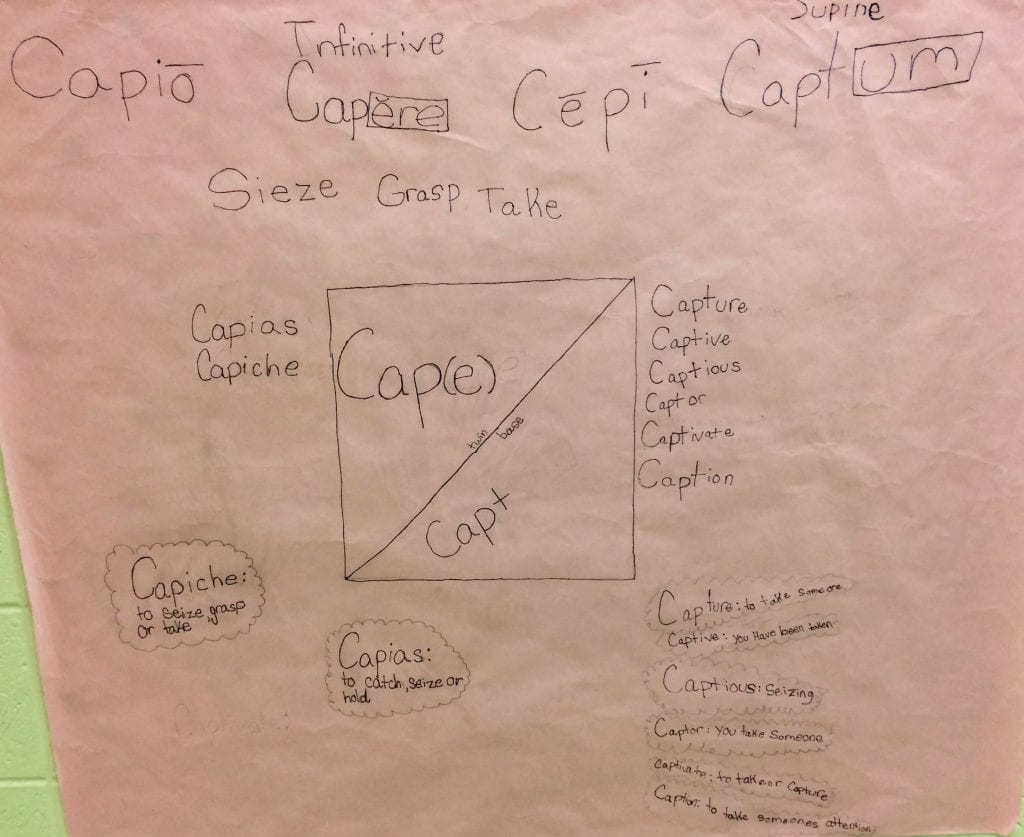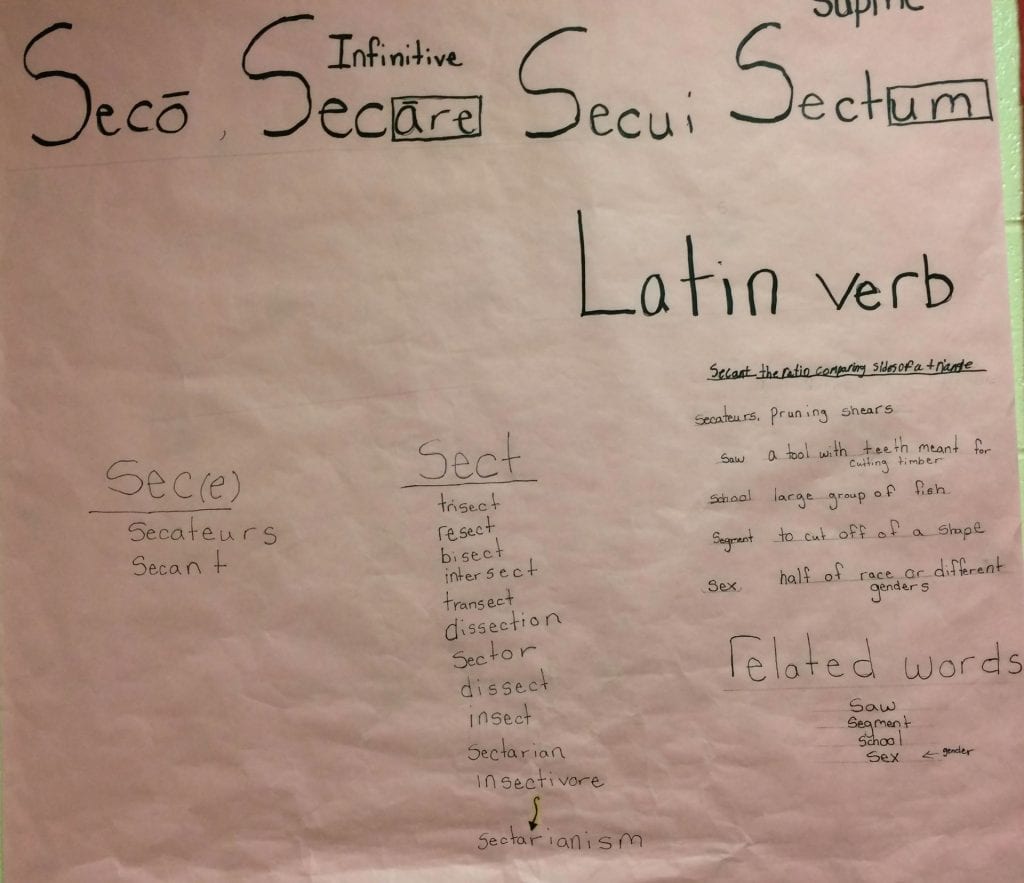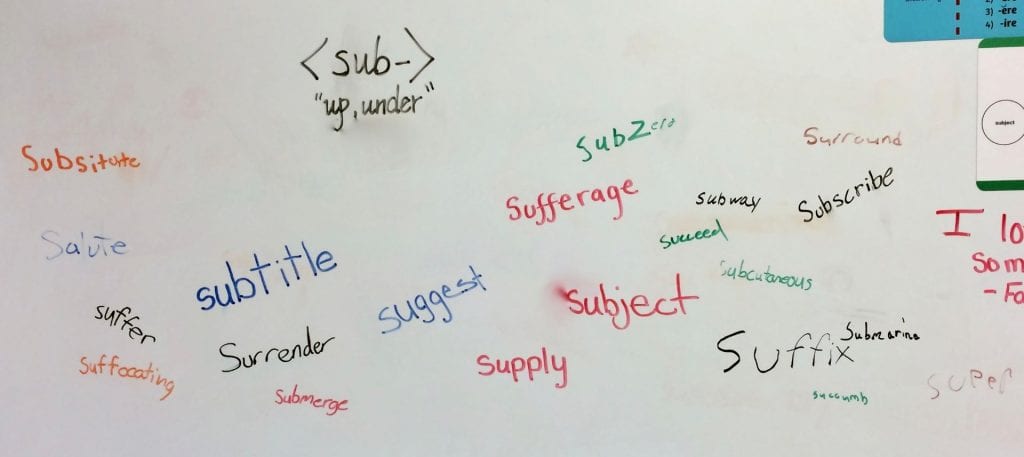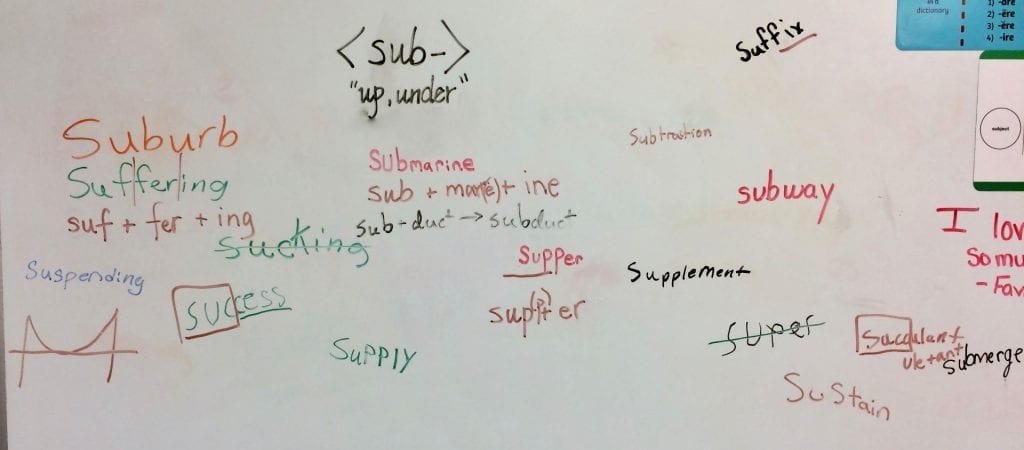My students have been working on several things lately. Some have been looking at specific graphemes/digraphs and the phonemes that they can represent. Others have been looking at prefixes and the assimilated forms they often have. Still others have begun to explore Latin verbs and the unitary/twin bases that come from them. So with all of these different investigations going on at once, how do I make sure that all the students are learning all these things? It happens on a day like today. It happens when I plan a simple review that turns into a simply rich inquiry. I can’t imagine that any other review set up in the same way would yield anything less. You see this wasn’t a fluke. It didn’t just happen once today. It happened three times … in each of my three classes. Fortunately I set up my camera during one of the classes and am able to invite you in. If I tried to tell you all about it without letting you see for yourself, you might think I was exaggerating.
Setting the scene …
Here are a few of the posters my students have presented lately. When I say they presented the poster, I mean they told the class what their investigation was all about. They read any words they found that were related to the investigation, and then they shared the definitions of some of the words that were new to them as they investigated. After that, the students listening asked questions and discussions ensued.
With other investigations still in process, I thought it was a good time to pause and reflect on what we have been learning. Every once in a while I see the students sliding back into the comfortable yet unproductive habit of robotic research. I define that as collecting what has been asked for without thinking about what the words mean or whether or not they fit the focus of the investigation. Their whole spelling lives they have been asked to mindlessly focus on letters and letter strings. They have not been asked to see those letter strings as anything in particular. I am asking them to think critically about whether those letter strings constitute a morpheme in a word. This is a new skill for most.
Before the students walked in, I wrote the prefix <sub-> on the board along with the most common sense it brings to a base, “up, under.” Then once the students were seated, I asked them to think of words with a <sub-> prefix. It could actually be <sub>, but it could also be one of this prefix’s assimilated forms (<suf>, <sug>, <sup>, <suc>, <sur>). Here is what the board looked like:
At this point I asked the students to look at the board and let me know what they thought. Did all of these words indeed have an <sub-> prefix or one of its assimilated forms? Is there anything you question or wonder about?
I turned on my camera and the students were engaged in discussion for 50 minutes. Fifty minutes! Take a listen and see where their questions and observations took the discussion. (Don’t worry. I edited so that the first video is 12 minutes and the second is 7 minutes. I must say it was hard to find parts of the discussion to cut. It was all as great and interesting as what you are about to see!)
As you can see, the questions just kept coming and the students exhibited a comfort level in using the resources (on this day it was Etymonline and the Collins Gage Canadian Paperback dictionary). They were connecting dots all over the place! They were understanding familiar words in a new way and understanding unfamiliar words enough to connect them to other words by their structure. Structured Word Inquiry is never about memorizing a word’s spelling. It is about understanding it. But becoming a better speller is a pretty reliable side effect of the work my students do each day. We talk about words every day whether we are focused on SWI or not.
When my third group of fifth grade students brainstormed their own list of words with the <sub-> prefix or one of its assimilated forms, this is what the board looked like. I did not take video, but you can imagine by what you see that it was every bit as rich a discussion as with my middle class. You’ll notice that some of the same words were thought of by students in each class, but then there were words that didn’t appear in the last group’s discussion. Is that important? I don’t think so. We focused on the meaning and structure of the words. And when we needed it, we went to a resource to find out which language the word originated in and perhaps what other languages had an effect on its spelling.
You will notice that we crossed off the words <sucking> and <super>. It was in a quick discussion that a student explained why the <suc> in <sucking> couldn’t be a prefix like we see in <success>. In the word <sucking>, the students recognized that the base was <suck> and that the <ck> was representing one phoneme, /k/. The students decided that if <super> had an <sup> prefix, that would leave <er> which is a pretty common suffix. But then there wouldn’t be a base! As I did with the other class, I had someone look up the word <super> to verify that the <sup> was indeed part of the base and NOT a prefix. As it turns out, this word is from Latin super “above, over, beyond.” This word is a free base and it’s spelling hasn’t changed at all! We talked about superheros and supervisors and how that denotation of “above, over, beyond” made sense.
That brought us to the word <supper>. Everyone was familiar with supper being a meal eaten in the evening. One hypothesis was that the prefix was <sup> and the base was <per>. Another was that the prefix was <sup>, the base was <p>, and that the suffix was <er>. I had someone go get a dictionary. That person reported that the base was <sup> with a denotation of “dine.” That meant that the <er> was a suffix and the second <p> was the doubled <p> from when the vowel suffix was added. They were not familiar with the base <sup>, so I reminded them of the base <hap> that we see in <happy>. A very similar thing happens in that word. So even though the <sup> in <supper> is followed by a <p>, that doesn’t mean it is a prefix. In this word, the <sup> is the base! It’s a third word we could have crossed off.
Since we had just found a word in which the <sup> was a base and the <p> that followed it was the doubled <p>, someone wondered if the same thing was happening with <supply>. They asked if <sup> was the base and there was an <ly> suffix. But then someone else pointed out that <ly> is a consonant suffix and wouldn’t cause doubling. (It is so amazing and wonderful to watch one student’s understanding broaden another student’s understanding!) So then the student who had raised the question went to get a dictionary to find out whether or not the base was <ply>. The student found out that in this word, the prefix <sub> has a sense of “up” and that <ply> is from Latin plere “to fill.” Someone immediately thought of buying school supplies. Someone else thought of the way the school supplies desks and chairs for the students. Both are example of items that fill a need.
From <supply> we went directly to <supplement>. I wondered aloud what a supplement was? Someone was familiar with a supplement being extra sheets of ads that comes with their newspaper. I mentioned that I sometimes take a supplement. I sometimes take a vitamin C tablet. Several students nodded and shared that they sometimes do too, like when they have a cold. So we came to the understanding that a supplement is something added to something else. When a student looked in the dictionary, the student found out that <supplement> is from Latin supplere “to fill up.” Then the entry said, “See supply.” Aha! This is the same Latin base we saw in <supply>!
Another interesting word was <submarine>. The students were pretty confident that <sub> was the prefix here because they knew that a submarine was a vessel that went under the water. So I asked if they thought <marine> would be the base or whether it could be further analyzed. It was quiet for a bit while everyone gave it some thought. Then someone said, “Could the <ine> be a suffix like in <saltine>?” I added, “And <routine>.” Hmmm. A student once again offered to look up <marine> to see what evidence there was to help us with identifying the base. The student found out that it was from Latin mare “the sea”, which really made sense to everyone seeing as a submarine goes under the sea! Could we think of any other words with <mare> as its base? I thought of <maritime> which I explained as having to do with the sea. I could say that a dolphin is a maritime mammal, meaning it lives in the sea. Then, when I was just about to move on, someone suggested a student’s name. Marissa. I had no idea if that would share the base or not. It shares spelling, but that doesn’t necessarily mean they share meaning. So I told Marissa to get a Chromebook and find out what her name meant. Sure enough! It comes from the Latin maris “of the sea!” How about that?
Reflections …
In each of my three classes we started the same way, but then followed the path led by their questions. Over and over we talked about the prefix <sub> and the sense it brought to each of the words it was part of. We made great discoveries about some unfamiliar bases, both bound and free. We even talked about twin bases when the opportunity arose. They eagerly jumped up to get a dictionary when we were ready to understand a word’s structure better. We connected the literal meanings of the base and prefix to what we understood the words to mean in our daily lives. We stretched that understanding to other words with the same base when we could. Most importantly, the students looked critically at the words and determined for themselves whether or not there was an <sub-> or other assimilated form of an <sub-> prefix. When the letters at the beginning of the word were found not to be a prefix, the students could explain why that was.
This kind of critical thinking, this kind of scientific inquiry comes without judgement. Students offer suggestions without the fear of being wrong and the embarrassment that goes along with that. Everyone has the same pursuit, which is to make sense of a word’s spelling. And everyone participates in that common pursuit. Some think to themselves. Some think out loud. Some ask questions. Some jump at the chance to look something up in one of our dictionaries or at Etymonline. The engagement is high and the delight in discovering something about a word or a connection being made is often audible. (And usually accompanied by a sweet smile!) This is what I have always imagined learning to be like! As Malina said at the end of the second video, “Every single time that someone comes up with an idea, we should put a little light bulb above their head.” Man would there ever be a glow coming from our room!

